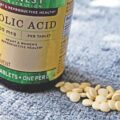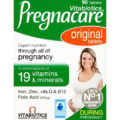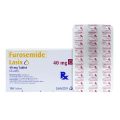Folic acid is a B vitamin. It helps the body make healthy new cells. Everyone needs folic acid. For women who may get pregnant, it is really important. Getting enough folic acid before and during pregnancy is very important.
Folate is involved in a number of vital metabolic processes, and deficiency leads to an array of negative health outcomes, including megaloblastic anemia, increased risk of heart disease and certain cancers, and birth defects in infants whose mothers were deficient in folate.
Folate deficiency has multiple causes, including:
- poor dietary intake
- diseases or surgeries that affect folate absorption in the digestive system, including celiac disease, gastric bypass, and short bowel syndrome
- achlorhydria or hypochlorhydria (absent or low stomach acid)
- drugs that affect folate absorption, including methotrexate and sulfasalazine
- alcoholism
- pregnancy
- hemolytic anemia
- dialysis
Many countries, including the United States, require grain products to be fortified with folic acid to reduce the incidence of folate deficiency.
This is because folate deficiency is somewhat common, and some populations, including older adults and pregnant women, find it difficult to obtain the recommended dietary intake through diet.
Recommended intake
The Office on Women’s Health recommends that women who are or might become pregnant take 400–800 mcg of folic acid per day, and that people with spina bifida or a family history of neural tube irregularities take 4,000 mcg per day. Those who are breastfeeding should aim to take around 500 mcg per day.
The body absorbs folic acid from supplements and fortified foods better than folate from naturally occurring foods.
The Office of Dietary Supplements recommend that people get the following dietary folate equivalents (DFEs) from food or vitamin sources:
| Age | Recommended amount |
| 0–6 months | 65 mcg DFE |
| 7–12 months | 80 mcg DFE |
| 1–3 years | 150 mcg DFE |
| 4–8 years | 200 mcg DFE |
| 9–13 years | 300 mcg DFE |
| 14–18 years | 400 mcg DFE |
| 19+ years | 400 mcg DFE |
Foods To Avoid When Taking Folic Acid
Despite its huge importance, taking too much folic acid can have some unpleasant results. This explains why you should avoid some folic acid-rich food when you are already taking supplements that meet your daily requirements.
Keep an eye on the volume of the following folic acid-rich foods while already taking folic acid supplements:
- Beans
- Dark green leafy vegetables (turnip greens, spinach, romaine lettuce, asparagus, Brussels sprouts, broccoli)
- Eggs
- Fresh fruits, fruit juices
- Liver
- Peanuts
- Seafood
- Sunflower seeds
- Whole grains.
Signs of Toxicity
The upper limit for folic acid is set at 1,000 mcg daily because studies have shown that taking higher amounts can mask a vitamin B12 deficiency. This deficiency occurs most often in older adults or those eating a vegan diet in whom a B12 deficiency is more common. Both folate and B12 are involved in making red blood cells, and a shortage of either can result in anemia.
A person taking high-dosage supplements of folic acid may be able to correct the anemia and feel better, but the B12 deficiency still exists. In this case, if high folate intake continues to “hide” the symptoms of B12 deficiency for a long time, a slow but irreversible damage to the brain and nervous system may occur. If you choose to use a folic acid supplement, stick with the lower range available of 400 mcg a day or less, as you will likely obtain additional folic acid from fortified foods like cereals and breads, as well as natural folate in food.
Overall, the evidence suggests that the amount of folic acid in a typical multivitamin does not cause any harm—and may help prevent some diseases, especially among people who do not get enough folate in their diets, and among individuals who drink alcohol.






